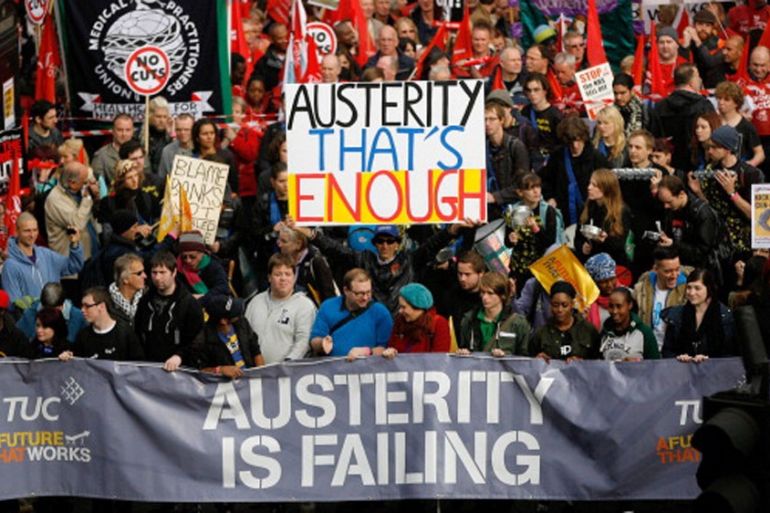Reanimation of the transnational left
As the era of economic crisis produced a decline in living standards, the centre-ground began to fragment.

In the traditionally placid states of Europe and North America, there are signs of political polarisation not seen for decades. Nor is this purely a phenomenon of Southern Europe, where Berlin-driven austerity has aroused mass votes for Syriza and Podemos.
The emergence of Donald Trump and Nigel Farage on one side, and Bernie Sanders and Jeremy Corbyn on the other, as serious contenders across the Atlantic, indicates that the old political establishment is in crisis.
In a way, this is what we should expect. If there is one intuition that unites almost every shade of political opinion, it is that economic crisis means political turmoil. Our model for such moments derives from William Butler Yeats’ over-used lines, “Things fall apart; the centre cannot hold …”
|
|
| Inside Story – The true cost of austerity |
And yet, if truth be told, the situation in most of Europe and North America immediately following the credit crunch was remarkably stable. The centre held with impressive tenacity.
Union membership continued to fall, rates of industrial action remained at historic lows and barring some brief social explosions in 2011, there was little at first to suggest popular discontent.
In both the UK and US, politicians from the centre were elected to handle the crisis – from an anticlimactic “Cleggmania” to the far more plausible “Obamania” of President Barack Obama.
Far from radicalising, the majority of people appeared to be searching for an “honest broker” – a humane technocrat – to manage a situation that was both frightening and disempowering.
Right-wing rebellions
As the era of economic crises produced a steep, long-term decline in living standards, the state of suspended animation slowly broke down, and the tenuous centre-ground began to fragment.
The immediate beneficiaries, contrary to the hopes of student protesters, Occupiers, and those inspired by Tahrir Square, were the Right. In the UK, nationwide riots in 2011 inaugurated a protracted right-turn punctuated by a series of moral panics about Islam and immigrants.
Also read: Anti-austerity: A political revolution
In the US, the initiative and money were almost entirely on the side of the Tea Party, whose encroachment on the Republican Party has terrified the old establishment.
These right-wing rebellions are based, in both cases, upon downwardly mobile layers of the middle class. They have each found political expression in the form of a transgressive figure: Donald Trump, a bellowing Howard Beale of the Right; Nigel Farage, a stressed-out spiv, defending provincial British values against a metropolitan establishment.
They are each creatures of the media – Trump a reality star in his own right – yet, both depend upon a stagy antagonism with the media elites whom they depend on. They act as advocates who translate parochial bigotry and spite into a language cut from mainstream cloth.
What has happened here is that the form of business-minded, centre-ground politics that has been dominant since the mid-70s has entered into a crisis because the growth model it depends upon works for fewer and fewer people, and the values it generates alienates wider social layers.
Although both Trump and Farage aggressively defend “free market” ideas, they are willing to lean on economic populism in order to entice working class votes. Farage claimed to oppose the bedroom tax and NHS privatisation, while Trump came out against cuts to Medicare and Social Security.
But whatever the tactical policy shifts they engage in, their core appeal is to the traditionalist, respectable middle class, threatened by new, diverse coalitions of the poor and oppressed and turning toxic in their desire to control the menace.
Enters anti-neoliberalism
This year has, following some delay, seen the reanimation of the Left by means of two electoral campaigns.
Bernie Sanders of the US Democratic Party, and Jeremy Corbyn of the British Labour Party; each advocates an anti-neoliberal agenda appealing to those expanding layers of people excluded from an economy based on debt and speculation.
Like Farage and Trump, they channel popular rage; unlike them, however, they explicitly resist political sadism, stressing charity and even “kindness” – an almost utopian idea when austerity depends on targeted cruelty.
Also read: Politics of the disenchanted
How have they succeeded where others have failed? By reversing one of the most deep-rooted trends in the industrial democracies – the declining political participation among the young and poor.
Their campaigns are notable for galvanising hundreds of thousands of largely young people. Corbyn’s campaign single-handedly saved the Labour Party from a long, agonising death-by-Pasokification, wherein a social-democratic party loses its base in its pursuit of austerity.
Sanders, lacking funding from the biggest donors, has nonetheless held the largest meetings in the entire campaign, and in some parts of the US, he looks set to defeat the far more comfortably moneyed Hillary Clinton.

What has happened here is that the form of business-minded, centre-ground politics that has been dominant since the mid-70s has entered into a crisis because the growth model it depends upon works for fewer and fewer people, and the values it generates alienates wider social layers.
The parties of the old consensus, the “extreme centre”, as British writer Tariq Ali has dubbed it, are at a transitional moment.
Either they can adapt, accepting elements of the agenda of both left and right – this would buy them some time to ride out the ongoing jitters; or they can attempt to purge themselves and continue to govern from the centre, with the likely result of losing more democratic legitimacy and even endangering their future survival.
Richard Seymour is an author and broadcaster based in London. He has written for the Guardian, the London Review of Books and many other publications.
The views expressed in this article are the author’s own and do not necessarily reflect Al Jazeera’s editorial policy.
